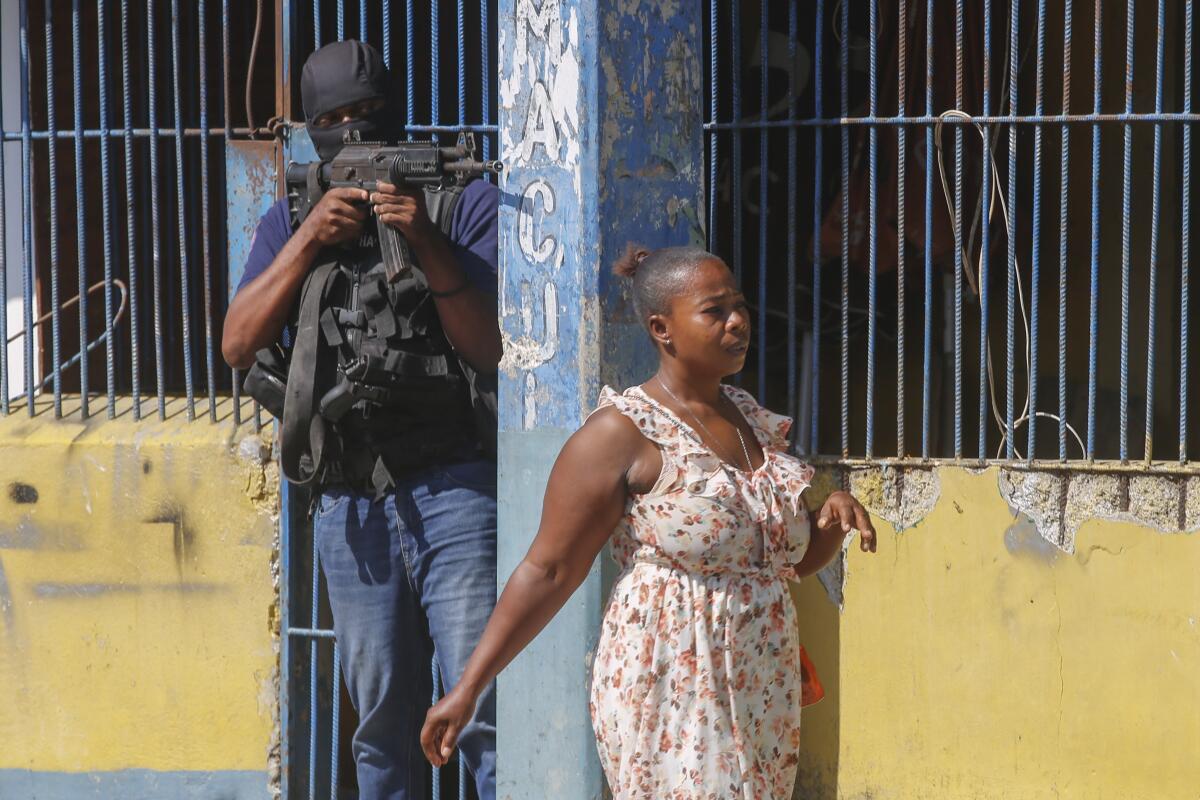A plan to find new leadership for Haiti is moving forward, Caribbean officials say

PORT-AU-PRINCE, Haiti â A plan to create a transitional presidential council is moving forward after a majority of Haitian parties and coalitions submitted the names of those tasked with finding new leaders for the country, Caribbean officials said Thursday.
The names were provided to a regional trade bloc known as Caricom that is helping lead the transition.
âIt is all up now to the Haitians as they are the ones who want a Haitian-led solution,â Surinamese Foreign Minister Albert Ramdin told the Associated Press. âIt is for them to pick up the ball and run with it, being responsible for their own destiny.â
He spoke a day after Haitian politicians and influential figures bickered publicly about the plan and what names to submit, seemingly putting creation of the council at risk.
The push to create a council comes as Haitiâs capital and other areas become increasingly overrun by powerful gangs that control about 80% of Port-au-Prince.
Caribbean leaders had announced plans to create the council after meeting in Jamaica on Monday behind closed doors with officials including U.S. Secretary of State Antony J. Blinken. Shortly after the meeting, Prime Minister Ariel Henry pledged to resign once the council is created.
The council will be responsible for choosing an interim prime minister and a council of ministers, as well as help organize general elections, which havenât been held in nearly a decade.
âWe hope this is a breakthrough for Haiti,â Ramdin said.
He said Caricom officials met Wednesday night for an update on the situation.
The names havenât been made public, although a senior Caribbean official not authorized to speak to the media told the AP that the Dec. 21 Agreement group, which backs the current prime minister, has not submitted a name.
Others awarded a spot on the council are EDE/RED, a party led by former Prime Minister Claude Joseph; the Montana Accord, a group of civil society leaders, political parties and others; Fanmi Lavalas, former President Jean-Bertrand Aristideâs party; the Jan. 30 Collective, which represents parties including that of former President Michel Martelly; and members of the private sector.
The remaining two nonvoting positions would go to a member from Haitiâs civil society and its religious sector.
Jean-Charles Moïse, who leads the Petit Desalin party and has allied with former rebel leader and convicted money launderer Guy Philippe, announced Wednesday that his party would not join the council despite being offered a voting position.
Moïse insisted that a three-person presidential council he recently created with Philippe and a Haitian judge should be implemented. His ally, Philippe, who helped lead a successful revolt in 2004 against Aristide and was recently released from a U.S. prison, said no Haitian should accept any proposal from the international community.
Powerful armed gangs that control 80% of the capital are demanding a say in the future of the country under siege.
It wasnât immediately clear what would happen to the position rejected by Moïse and his party.
Prime Minister Henry is in Puerto Rico, locked out of Haiti because gang attacks have shuttered the countryâs airports.
The gang attacks began Feb. 29, when Henry was in Kenya to push for the United Nations-backed deployment of a Kenyan police force. The deployment has been temporarily suspended.
âMy concern is that the longer there is a power vacuum and an effort to figure out a way forward on the political side, every day that delays resolutions, many, many people are dying,â William OâNeill, the U.N.âs independent expert on human rights in Haiti, said before the plan began moving forward.
Armed men in the capital of Port-au-Prince have set fire to police stations and stormed the countryâs two biggest prisons, releasing more than 4,000 inmates. Among those who fled are gang leaders of at least seven communities, according to information given by officials who are not being quoted by name out of safety concerns.
As of March 10, gunmen attacked or torched at least 30 state institutions, more than 600 homes and private businesses and nearly 500 public and private vehicles, the officials said.
Gangs also have attacked neighborhoods in a rampage that has left scores dead and more than 15,000 homeless.
âThis is absolutely catastrophic,â OâNeill said. âI describe Port-au-Prince now as an open-air prison. There is no way to get out: land, air or sea. The airport is still not functioning.â
The violence has started to subside, although a fire was reported Thursday at the National Penitentiary in downtown Port-au-Prince, one of two prisons attacked more than a week ago. It wasnât immediately clear if anyone was injured or killed in the blaze or how it started.
Schools, gas stations and airports remain closed in Haitiâs capital and beyond, although public transportation has resumed, and a growing number of Haitians have been seen on previously empty streets.
Associated Press writer Luxama reported from Port-au-Prince and Wilkinson from Georgetown, Guyana.
More to Read
Sign up for Essential California
The most important California stories and recommendations in your inbox every morning.
You may occasionally receive promotional content from the Los Angeles Times.











